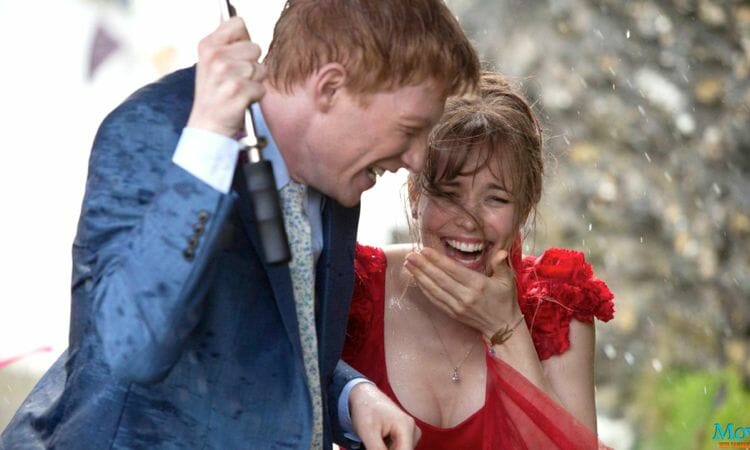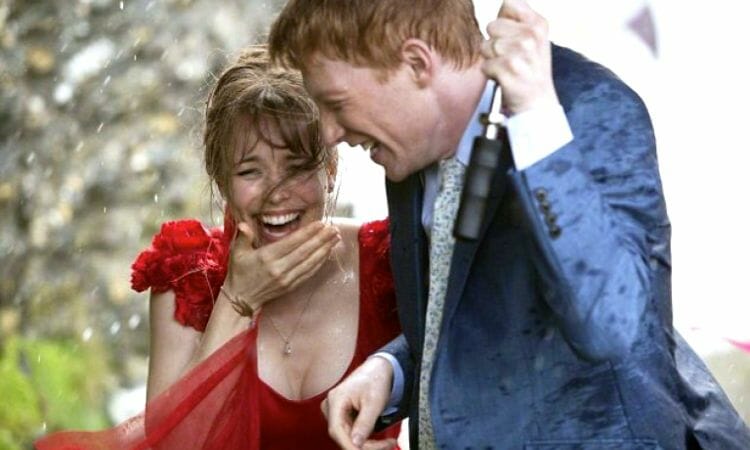Sign up for the
TSL Newsletter
and get $50 off Final Draft 12
By Chris Yates · August 24, 2014


As a child of the 80’s, action was my game. A film wasn’t a film unless it had a muscle bound hero (usually in the mould of Stallone, Schwarzenegger or Willis), facing ever ridiculous odds as they stood alone, facing the tyrannies of the world. They were my heroes and where my love affair with all things cinematic began. So, you could imagine my horror when on ‘Movie Night’ (usually a Friday in our household), my wife rolls up with the latest Romcom from British writer/director Richard Curtis, ‘About Time.’ I took my place on the sofa, fighting the depressive notion of witnessing the latest incarnation of Rachel Greene, running through the formulaic motions of boy meets girl, boy loses girl, boy faces ever repetitive odds to win girl back, happy ending! What I got reshaped my entire opinion of the genre. Never have I been so happy to be so wrong!
The premise of About Time is simple: Not long after his 21st birthday, and a disastrous New Year’s Eve party, Tim (played by the brilliant Domhnall Gleeson) is told by his father (Bill Nighy) that all the males in the family have the ability to travel back in time, and change what happens or has happened in their own lives. Tim decides to use his new found gift to find the one ‘true gift’ of life, love.
The film is essentially told in two acts and on first viewing appears to pull you in two different directions. The first half is the formulaic approach that renders the film a romcom. Following a disappointing summer, when Tim fails to win the heart of his first love, he moves to London to pursue a career and restart his life. It is here that he meets the love interest of the piece, Mary (played by Rachel Mcadams). What ensues are the ups and downs as Tim meets the girl, gets the girl, loses the girl, gets the girl again and, just as we are about to get the happy ending and complete the formula, we realize that we are only halfway through the film. The first act (as I’ll refer to the opening hour) is smartly crafted, light hearted entertainment as Tim uses his gift to keep reliving the chance encounters with Mary until he gets them right, culminating with one of the funniest sex scenes committed to film. However, as all this is going on, what we miss, as it is so subtlety, but perfectly done, is the building of the relationship between Tim and his Father, because at its heart, relationships and family are what this film is about.
As we reach the midpoint of the film, Tim is given the best and worst news a man can be given; he is about to become a father and his own father is dying. At this point the focus of the film shifts. We step away from the light-hearted comedy we expected and move into the realms of a deep moving, profound narrative. As an audience we question our own morality and Curtis doesn’t hide from the truth when providing the answers. We can see what is coming, even before the characters do, and when the moment arrives you feel like you are no longer watching a film, but a glimpse into the future of your own life and the second chance you always wished you would have to say goodbye. It’s powerful stuff, and beautifully told. How you react to the unfolding story, and the heart-warming/breaking scene on the beach, will answer questions about your own character and what you truly treasure in this life.
However, for me, the driving force of the piece are the characters themselves. Through Tim, Father and Mary, Curtis has created three central characters that are unique in their lack of uniqueness. They could be anybody, the family next door, the family up the street or, more importantly, the viewer themselves and this is key. Everybody knows a Tim, a man who doesn’t stand out from the crowd but rather is the crowd. His character is universal and can’t be shoe boxed to a specific sex. The fact that Domhnall Gleeson plays him straight and nothing like the stereotypical character of the genre, only serves to strengthen the bond between character and viewer. Father is played how only Bill Nighy can; himself, the epitome of cool. He bounces off Tim and provides the light hearted relief to Tim’s troubles. Their bond is the real measure of the film and the chemistry between the two actors is the backbone. Finally Mary. Putting Rachel McAdams beauty to one side, Mary represents what we all look for in love, the one person who brings out the best in us, and the one that makes us truly happy. Her relationship with Tim is what we wish for ourselves, if only we had his many chances to get it right!
About Time is a beautiful film, reminiscent of a time when Hollywood was reliant on solid storytelling as opposed to massive budgets and CGI. Yes, like Zemekis’ Back to the Future Trilogy, if you tried to analyse it, you would find more holes than you would find on a pin cushion, but that’s not what this film is about. Films are escapism, they are meant to take you on a journey, a ride of many emotions that leaves you exhausted, fulfilled and in some cases thirsty for more. The highest accolade I can pay About Time is the tear I still get in my eye when I think of it… Marvellous storytelling.